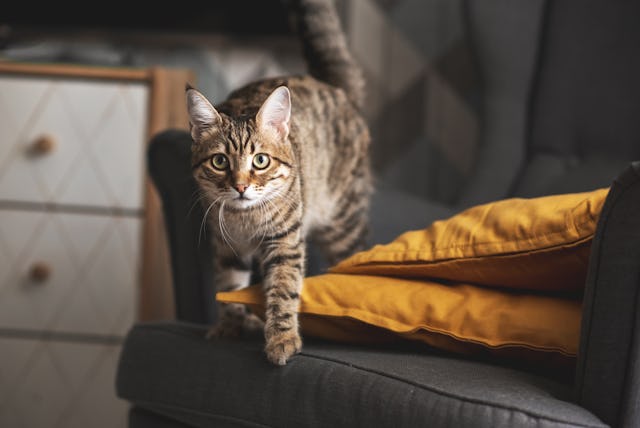Why Does Your Cat Act Like A Psycho At Night? Experts Explain How To Stop It
Love you so much but STOP YOWLING.

Your cat is a normal well-adjusted citizen during the day, napping in the sun and asking for pets in passing. Maybe they have some annoying quirks, like splashing their water everywhere before drinking it, but they seem pretty chill and mentally stable. But at night, they go absolutely feral. They're zooming, making demonic noises, and... are they literally bouncing off the walls in the other room right now? It's 3 a.m. for crying out loud.
So, why do cats act crazy at night? We asked veterinarians what causes the behavior, and more importantly, if there's anything you can do about it. You need to sleep, after all.
Why do cats act crazy at night?
Hate to say it, but the night zoomies are a natural and normal feline behavior, according to Dr. Aimee Warner, resident veterinarian at Waggel.
"Cats are crepuscular hunters, meaning they are most active in the early morning and late evenings. This is when their natural prey would be most active in the wild, and those instincts have not necessarily disappeared just because your cat now eats from a bowl in your kitchen. What we perceive as 'psycho' behavior — running around, leaping off the furniture, or batting at air prey — is actually your cat's inbuilt hunting instinct at work," she says.
All the cat naps your kitty sneaks in throughout the day don't help your case either. "If your cat is sleeping a lot during the day, they'll have accumulated energy by nighttime, which leads to what pet parents like to call 'going psycho' at bedtime. It's completely normal behavior, albeit a little inconvenient," says Dr. Berkcan Yanar, a licensed veterinarian and reviewer at PawsRank.
Should you ignore the night zoomies or try to correct them?
Warner and Yanar say pet parents often ask them what to do in the moment to discourage their cat's off-the-wall behavior in the middle of the night.
"My answer is always that it's OK to ignore it if you're sure there is no medical issue, but don't reinforce the behavior by getting up and feeding them or playing with them in the middle of the night. That just feeds the anarchy. Some people wonder if bringing in another cat will calm it, and sometimes it will, if the cats are well-matched to one another. Otherwise, it can just double the 3 a.m. zoomies," Yanar says.
"Beyond any underlying medical conditions and if they are not exhibiting problematic behavior, it is OK not to reward such behavior with attention," Warner says. She also recommends making sure your nighttime space is cat-proofed. Heavy furniture should not be able to be tipped over, and maybe tuck away fragile items you don't want knocked off a counter or end table.
How To Get Your Cat To Sleep At Night
It doesn't take much to get your cat to chill in the wee hours of the morning. You just have to put their hunting instincts to good use at a more appropriate time.
"Play with your cat for about 15 to 20 minutes in the evening before bedtime with active toys like feather wands or laser pointers. Then follow that with a small high-protein meal or treat, which mimics the hunt-eat-sleep cycle and exhausts them," Yanar says. "Offer plenty of stimulation during the daytime hours, like window perches, puzzle feeders, or even a bird-watching video, so they're not sleeping 16 hours continuously and tanking up to rave at 2 a.m."
Warner agrees that giving your cat plenty of stimulation during the day is key to getting them on your sleep schedule, and seconds the trick of having a structured play, treat, then sleep routine before bed. "Zoomies at night can be tiring, but with a bit of structure and environmental modification, you can definitely get your cat — and your home — sleeping better at night."
Should you be worried about your cat's night zoomies?
If your cat used to not act possessed at night but suddenly seems inhabited by an evil being, bring it up with your vet. Any sudden behavioral change is always worth investigating, Warner says.
"If your once non-zoomie cat suddenly starts doing this, it might be due to heightened stimulation, like a shift in family routine, or even boredom. But if the behavior is extremely out of character, it is a good idea to explore possible underlying medical causes. Hyperthyroidism, hearing loss — which can make them more prone to being startled — or even cognitive decline in older cats can be the cause of restlessness at night. A quick vet visit can rule out medical causes and give you peace of mind," she says.